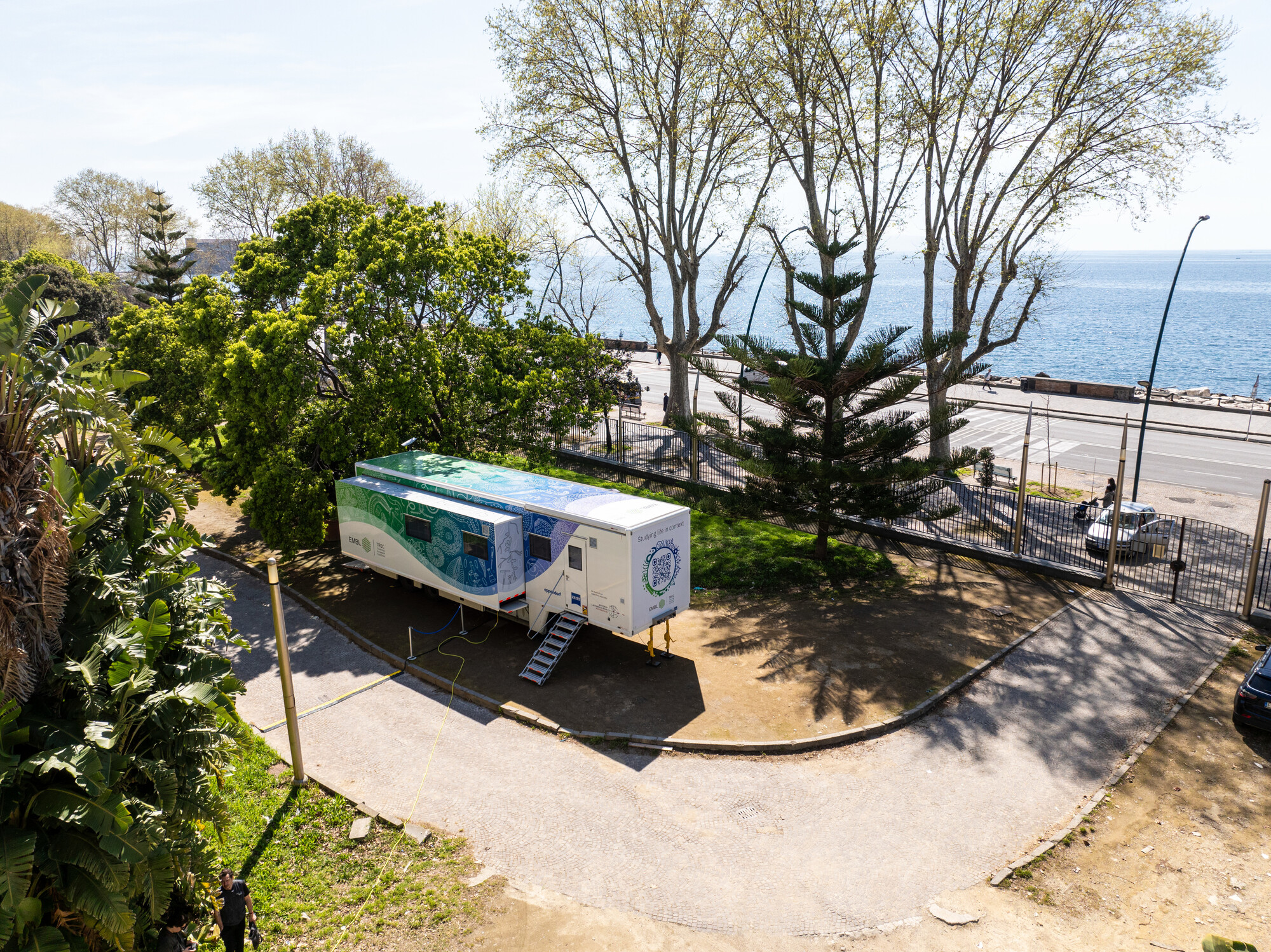The Stazione Zoologica Anton Dohrn in Naples hosts the main stop of the TREC scientific expedition
Naples was chosen as the only Italian ‘super-stop’ of the expedition and will offer scientific and public engagement activities.
TREC – the expedition combining scientific activities on land and at sea at an unprecedented scale – arrives at the Stazione Zoologica Anton Dohrn in Naples.
After eight months of sampling the European coastline along the Atlantic, Baltic and North Sea throughout 2023, the TREC expedition will explore the Mediterranean coastline in 2024 and in particular the Naples area – chosen as the main stop in Italy. Scientific activities, conferences and public engagement activities are planned in the city for over a month.

The TREC expedition is led by the European Molecular Biology Laboratory (EMBL), together with the Tara Ocean Foundation, the Tara OceanS consortium and the European Marine Biology Resource Centre (EMBRC).
TREC is the first continent-wide project to study coastal ecosystems and their response to the environment. Our seas and coasts host an extremely rich diversity of life and play critical roles in the stability and sustainability of wider ecosystems. However, anthropogenic interferences are leading to accelerated loss of species’ genetic diversity and destruction of ecosystems. By sampling along the entire European coast, the TREC expedition will provide a richer and deeper understanding of how ecosystems respond to natural and human-made challenges.
The TREC expedition brings together more than 150 research teams from over 90 institutions in 21 European countries. At each stop, they work together with local partners, such as the Stazione Zoologica Anton Dohrn (SZN) in Naples.
The Stazione Zoologica Anton Dohrn in Naples, since its foundation in 1872, has made hosting international researchers and promoting basic research in Marine Biology its mission, and the connection with all the actors of the TREC expedition has deep roots: the SZN is coordinating EMBRC-Italy, it has already hosted the schooner Tara in 2014, and the collaborations between SZN and EMBL researchers are multiple and long-standing.
In 2019, SZN hosted the future TREC coordinators at its laboratories in Ischia, in a pilot experiment that laid the scientific and methodological foundations for the entire expedition.
In Naples, scientists travelling with EMBL’s mobile laboratories and onboard the Tara schooner will collect water, soil, sediment, and aerosol samples at Naples and surrounding areas of Pozzuoli and the Sarno river.
During the same period, the CNR’s oceanographic ship ‘Gaia Blu’ – currently engaged in a campaign specifically aimed at studying the Italian seabed – will accompany the Tara schooner to support the study of the Tyrrhenian coastline. This campaign will be coordinated by the CNR Institute for Biological Resources and Marine Biotechnology (CNR-IRBIM) for the study of microbial biodiversity, while the Biophysics and the Marine Institutes (CNR-IBF and CNR-ISMAR) will replicate the work carried out in TREC with a focus on biogeochemistry.
The main component of EMBL’s fleet of mobile laboratories, the Advanced Mobile Laboratory, will be based at the SZN in the Villa Comunale for over a month, and will provide cutting-edge technology directly in the field, helping researchers to process biological samples immediately after they are collected, using advanced instruments and methodologies.
A range of different activities for the media, schools, and the general public are offered during the expedition´s stay. Some of these activities are carried out with the support of the National Biodiversity Future Centre, one of the five National Centres dedicated to frontier research funded by the National Plan for Recovery and Resilience (PNRR), coordinated by the CNR and involving scientific institutions and enterprises throughout Italy, engaged in conserving, restoring, monitoring and enhancing Italian and Mediterranean biodiversity.
The aim of the expedition is to study the biodiversity and ecosystems on land and at sea, as well as the interactions of organisms with each other and with the environment. The scientific teams collect information on factors such as the presence of pollutants, antibiotics, pesticides, or hormones, as well as temperature, salinity, and oxygen levels.
At each point where the EMBL team and collaborators sample soil, sediments, and shallow water, the schooner Tara samples the associated marine ecosystems – on the same day and in the immediate vicinity.
Biological samples are fragile: as soon as a drop of water or crumb of soil is removed from its natural environment, the organisms within them begin to change. To maximise the integrity of organisms and to study them in the context of their natural environment, TREC is bringing the lab to the samples, instead of samples to the lab. In total, TREC will examine the biodiversity and molecular adaptability of life at the molecular scale at 120 coastal sampling sites across 21 European countries.
The pan-European nature of this project means that samples will be taken in a standardised fashion. This will make it possible to compare and probe data across Europe instead of a regional or national system in a way that was not previously possible.
EMBL acknowledges the generous support of many institutions, donors and sponsors, in particular the Manfred Lautenschläger-Foundation, Eppendorf SE, Carl Zeiss Microscopy, and Friends of EMBL in helping make TREC possible.
The TREC expedition benefits from Horizon Europe funding through the BIOcean5D project (GA#101059915).
Views and opinions expressed are however those of the author(s) only and do not necessarily reflect those of the European Union. Neither the European Union nor the granting authority can be held responsible for them.

